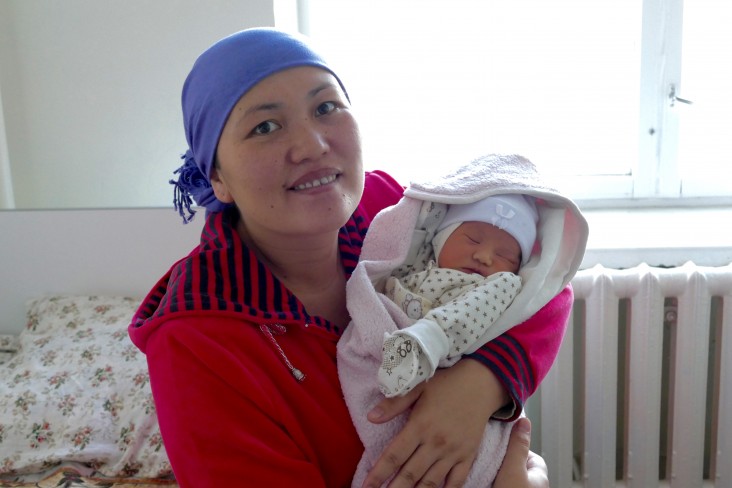
July 2017—In the Kyrgyz Republic, the high rate of facility-based childbirth presents an excellent opportunity to improve child nutrition by strengthening the counseling and services mothers receive before and after delivery. Although 99 percent of births are attended by a skilled provider, only 60 percent of newborns are breastfed within an hour after birth and only 41 percent of children under 6 months are exclusively breastfed.
Evidence shows that raising these numbers can help reduce infant mortality and prevent chronic malnutrition.
To improve support services for new mothers, the USAID-funded Strengthening Partnerships, Results, and Innovations in Nutrition Globally (SPRING) project is working with the Kyrgyz Ministry of Health to help 27 health facilities achieve the “baby-friendly hospital” designation. Created by the World Health Organization and UNICEF, the Baby-Friendly Hospital Initiative (BFHI) defines a global standard of optimal care for appropriate breastfeeding and services in support of mother/child bonding. An independent national review committee awards BFHI accreditation after a self-improvement process led by the hospital.
In 2016, two SPRING-supported hospitals—the Jalal-Abad Oblast Merged Clinical Hospital and the Toktogul Territorial Hospital—were designated mother- and baby-friendly by the review committee. The Jalal-Abad hospital delivers approximately 7,000 babies a year, serving as a referral center for 1.1 million people. It also provides medical care to women who have complex clinical needs or have been referred from remote areas after complicated deliveries. The Toktogul hospital delivers about 2,600 babies a year and provides health care services for 100,000 people.
“We continuously teach mothers about proper breastfeeding and promote early skin-to-skin contact,” says Ainagul Kasymbaeva, head of the maternity department at the Jalal-Abad hospital. “These simple practices brought an incredible result and have reduced common childhood illnesses in Jalal-Abad Oblast Merged Clinical Hospital. We are proud of achieving these results and being an example for other hospitals.”
Earning accreditation is not easy for low-resource hospitals. Prior to SPRING’s intervention, these hospitals lacked baby-friendly policies, employed staff who were not trained in optimal breastfeeding practices, and embraced widespread bottle-feeding of newborns. Understanding the importance of accreditation, facilities welcome the BFHI training and self-assessment process but face serious challenges, including lack of commitment by leadership, insufficient technical capacity among the staff (including medical specialists), high staff turnover due to low salaries, and aggressive marketing of breastmilk substitutes.
In response, the project involves facility leadership in trainings, meets with them to convey the importance of BHFI policies and improvements, and works to gain their commitment to achieving and sustaining baby-friendly designation.
SPRING has trained 146 doctors and nurses from the two hospitals and is providing ongoing technical assistance and educational materials. The hospitals have replaced bottles and formula with exclusive breastfeeding practices. They now provide mothers with appropriate breastfeeding counseling and guidance, and have established better conditions for mother and child bonding.
Since 2015, SPRING has trained 669 facility-based providers from 27 facilities in BFHI. Additionally, SPRING conducted 1,116 monitoring visits following BFHI training to help health facilities develop their quality improvement plans. Six additional SPRING-supported hospitals are scheduled for BFHI assessment in 2017.
The USAID project works to increase access to quality nutrition by training health care providers at the national level and in Jalalabad and Naryn oblasts. Because the Kyrgyz Ministry of Health has neither the resources nor a mechanism to fund the BFHI nationally, the project’s support is especially critical to the health of the country’s mothers and newborns.
LINKS







Comment
Make a general inquiry or suggest an improvement.